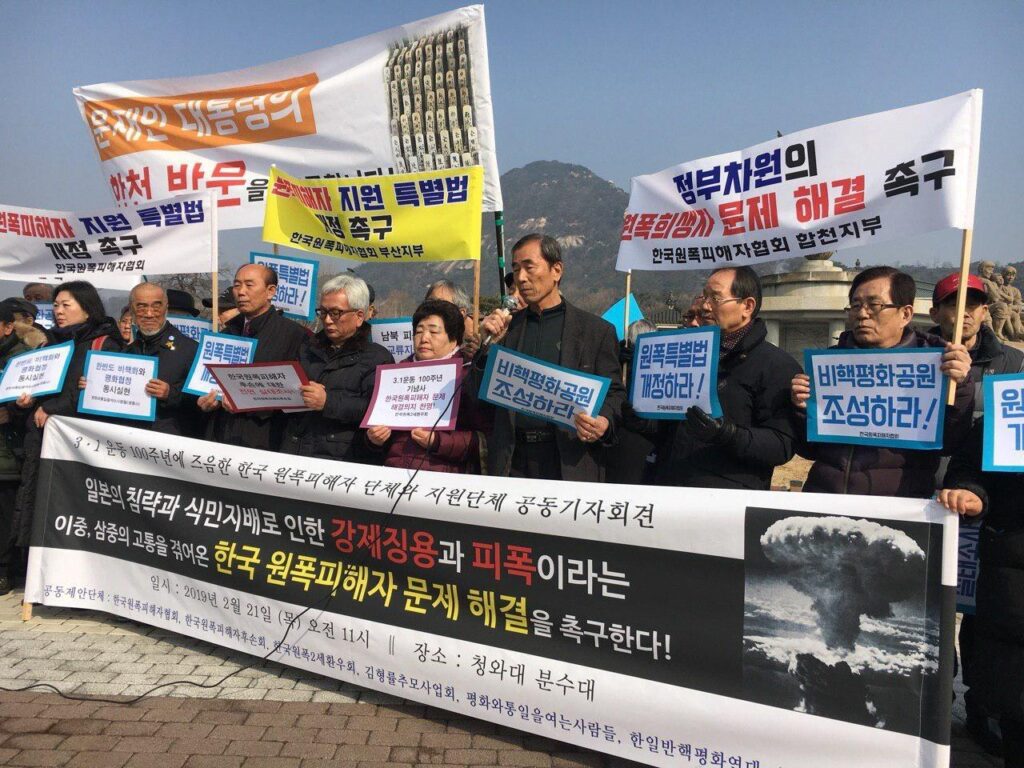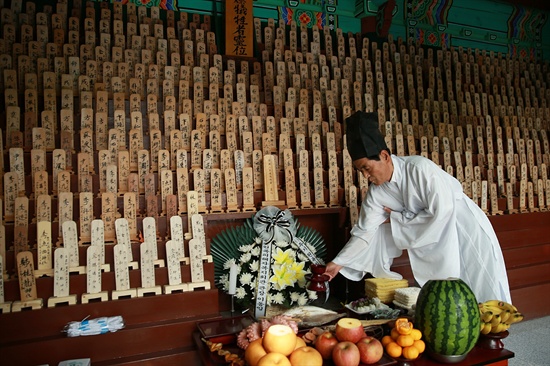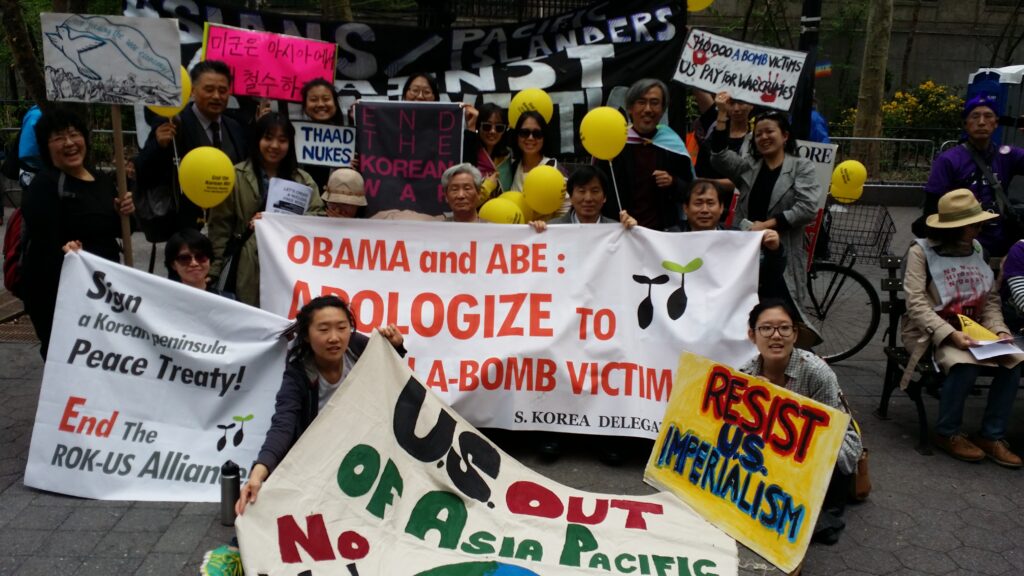Minju Bae, Demilitarization in the Time of Police Abolition: Korean A-bomb Survivors Demand Justice
August 6 and 9, 2020 mark seventy-five years since the US dropped atomic bombs in Hiroshima and Nagasaki. Despite how long it has been, A-bomb survivors continue to fight for justice, and in particular, Korean A-bomb survivors and their kin demand reparations for colonial intergenerational trauma that continues to deeply affect their lives.
The stories of Korean A-bomb survivors reveal the interconnected histories of colonial rule and US militarism. In our current moment, as abolitionists and Black liberationists call to defund the police, it is critical that we also take stock of how militarization functions abroad. Recognizing the multiple vectors of power that the US wields, we must follow the lead of abolitionists and defund the military. Bearing witness to the stories of Korean A-bomb survivors requires that the US grant reparations, formally end the Korean War, and further, support survivors’ demand for an international comprehensive ban of nuclear weapons with the Treaty on Prohibition of Nuclear Weapons. As we imagine a post-pandemic world that will repair the traumas and harms of the past, we must listen to Korean A-bomb survivors.

Sim Jin-Tae was born in Hiroshima in 1943, just a toddler when the US dropped the atomic bombs. Of the estimated 740,000 victims of the bombs, about 100,000 were from Korea, occupied by Japan since 1910. Like Sim’s father, most of the Koreans were conscripted laborers of imperial Japan. Many forced Korean laborers did not survive colonial rule or make it back to the peninsula; others, like the 43,000 Korean A-bomb survivors, returned to newly-liberated Korea and resettled in towns like Hapcheon, currently home to approximately one hundred living survivors.

But the survivors encountered a new form of militarism after World War II, where US military occupation in South Korea was made permanent with the unended Korean War that stopped with a temporary ceasefire. Further, despite their radiation illnesses, the Japanese and US governments have refused Korean survivors care and treatment. Korean A-bomb survivors like Sim call for peace and the demilitarization of the Korean peninsula, in their demands for justice.
Sim leads the Korean A-Bomb Victims’ Association, an organization formed in 1967 after the 1965 Treaty on the Basic Relations between Japan and the Republic of Korea denied reparations for Korean A-bomb survivors. In 2015, Sim was a member of a delegation from South Korea to the United States, to attend the Review Conference of the Party to the Treaty on the Non-Proliferation of Nuclear Weapons (NPT). Held every five years at the United Nations, this conference reviews the impacts of nuclear weapons and the path toward non-proliferation.
This year – 2020 – a thirteen-person delegation from Korea had planned to attend this conference at the UN, speak with public officials, attend rallies, hold public events, and raise awareness about Korean A-bomb survivors’ unique position in transpacific geopolitics. Their ongoing demands included reparations and medical treatment for Korean A-bomb survivors and their kin, as well as the denuclearization of the Asia-Pacific and a formal end to the Korean War. That is, this was the delegation’s agenda until COVID-19 swept the globe and starkly exposed US hypocrisies.
In the first half of the twentieth century, Japan was Korea’s colonizer. Many Koreans – forced migrant laborers, conscripted farm workers, miners, sexual slaves, and others – worked in Japan, providing cheap labor and sustaining Japan’s economy and “comfort.”
When the US dropped the atomic bombs on Hiroshima and Nagasaki, the US claimed that the bombs were a necessary evil to end World War II, a means to save American lives. But for Korean A-bomb survivors, the bombs revealed the terror of US militarism. After WWII, many of the survivors returned to Korea, but their relationship with warfare did not end. In Korea, they witnessed the brutalities of US intervention. One day after the bombing of Nagasaki, US military personnel took up the task of bifurcating the peninsula, determining the division along the 38th parallel and claiming Seoul for the American zone. During the United States Army Military Government in Korea (1945-1948) and the Korean War (1950-1953), the US installed pro-Japanese colonial collaborators in positions of power, carpet-bombed most of North Korea, and massacred civilians as potential enemies. When active fighting stopped with a temporary ceasefire rather than a permanent peace settlement, US military bases and camptowns proliferated throughout South Korea and Japan, with the latest weapons installed in rural towns in violation of the armistice. Supplanting colonial rule with military occupation, the experiences of Korean A-bomb survivors and their kin reveal the intergenerational harms of militarism and warfare.
Both Japanese and US governments have obscured the experiences of Korean A-bomb survivors. While the Japanese government refuses to provide medical treatment for Korean survivors and their kin, the US also denies responsibility. President Truman hid behind narratives of the “Good War” – that the atomic bombs were regretful but inevitable – in the service of securing an unconditional surrender from Japan and demonstrating US nuclear power. Today, the US still hides its empire behind claims that US armed forces secure global order, safety, and democracy. In the case of South Korea, the US justifies its military presence by pointing to the threat of North Korea. As the Korean War continues, the US’s nuclear stockpile looms large over the peninsula and the Asia-Pacific region.
Korean A-bomb survivors know the US military-imperial capacities first hand. Their 2015 delegation to the UN argued, “The United States, as the first country in the world to use nuclear weapons, must take responsibility for its crimes against the hundreds of thousands of atomic bomb victims, including the Korean victims.” In contrast to the depiction of World War II as the “Good War,” Korean A-bomb survivors emphasized that war was neither good nor did the bombs save lives.
The impact of the bombs spans multiple generations. Kim Bong-Dae – a Hapcheon resident and member of the 2015 delegation – married a survivor of the atomic bomb in Hiroshima. Their son developed a rare terminal illness – congenital immunoglobulin deficiency. Together as father and son, they have raised awareness about radiation exposure and its intergenerational effects, in order to hold the US accountable. A 2013 South Korean study of second and third-generation descendants of survivors reported that 20.2 percent of the subjects had congenital deficiencies and hereditary diseases. While the harmful effects of the atomic bombs are intergenerational, the US and Japan refuse to recognize these hereditary conditions, not to mention the lasting trauma.
To be sure, some A-bomb survivors did win their campaign for medical care and recognition. After the 1945 bombings, approximately 3,000 Japanese Americans who had been in Japan during World War II returned to the US. Both Hiroshima and Nagasaki had sent a large number of immigrants to the US prior to the war. Among Japanese immigrants, it had been common to send children to Japan for a few years of education, often to their parents’ hometowns like Hiroshima and Nagasaki. These American hibakushas (or survivors of the bombs) faced particular challenges, neglected by both Japan and the US. Doctors were reluctant to treat unfamiliar radiation illnesses, and survivors faced medical discrimination. In the 1970s and 1980s, hibakushas began to demand that the US create designated medical facilities to care for those with radiation illnesses. The leverage that hibakushas had was, in part, thanks to Asian Americans who had been politicized by stories of internment, drawing connections between US militarism at home and abroad. Asian Americans re-narrated histories, centering the human costs of militarism and racism. They provided legal support and recorded A-bomb survivors’ stories, dispelling myths about radiation contagion. American hibakushas eventually gained access to medical and monetary support from the Japanese government. But unfortunately this effort excluded Korean survivors.

As in the 1970s transnational campaigns for justice for hibakushas, Korean A-bomb survivors, their kin, and diasporic Koreans have been working together to secure medical treatment and reparations. In May 2020, activists from Nodutdol for Korean Community Development planned to host the delegation from South Korea, organize public events, and join the rallies in and out of the United Nations forum. In the face of the US and Japanese governments’ refusal to acknowledge the impacts of militarism and warfare, community-based organizations are bearing witness to the intergenerational traumas of Korean A-bomb survivors and their kin, demanding recognition and justice from the grassroots.
While the Japanese government provides care for Japanese American hibakushas, the US government has refused to care for any hibakushas – Asian American, Japanese, or Korean. For the US to provide medical care would be to admit wrongdoing; to take responsibility for the tragedies of the atomic bombs, beyond publicity stunts; to admit that nothing can justify the use of nuclear weapons; and to admit that the US needs to abolish its own nuclear arsenal, the largest in the world. But American exceptionalism denies the atrocities of the “Good War.”
While the US’s reputation takes a hit in the midst of the COVID-19 pandemic, the US has tried to compensate with its military might, flexing its muscles both at home and abroad – flying Air Force and Navy flight demonstrations over Northeastern city skies to “honor” frontline and essential workers, encroaching on indigeneous lands such as in the contested RIMPAC war exercises in Hawai’i, and shoring up weapons on bases on stolen lands throughout the Pacific – in spite of the global public health crisis. Under the guise of US peacekeeping, US militarism and interventionism stand in the way of Korean A-bomb survivors’ demands to defund the military.
It has been seventy-five years of medical discrimination, colonial trauma, and the ongoing threat of another nuclear war. It is also seventy years of halting efforts to reunite families, to secure a peace treaty to end the Korean War, and to create the conditions for Korean self-determination. Justice and reparations for Korean A-bomb survivors are impossible under these conditions of war, US militarism, and the shadow cast by the US’s vast nuclear arsenal. Just as Black Lives Matter globally, movements to abolish the police must link up with transnational movements for demilitarization and denuclearization.
Minju Bae is a historian who works at the intersection of Asian American Studies and labor history. She is also a member of Nodutdol for Korean Community Development.